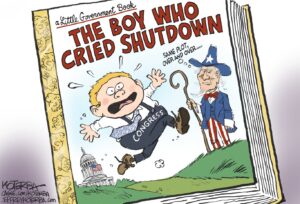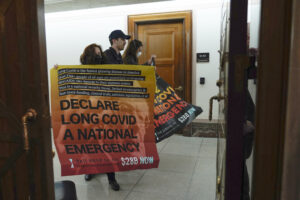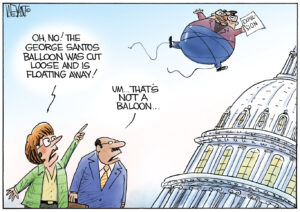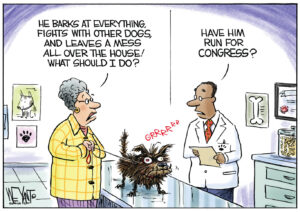The Eternal Flame
Ten summers ago, I asked Ted Kennedy's office to provide an account of key legislation he had sponsored in what already was a long and distinguished career. I received a very humble 32-page fax.Ten summers ago, for reasons I do not now recall, I asked Ted Kennedy’s office to provide an account of key legislation he had sponsored in what already was a long and distinguished career.
The 32-page fax I received in response is as notable for what it lacks as it is for the fullness of history it recounts.
There was no tone of pompous self-promotion that we are accustomed to expect from politicians — from U.S. senators, in particular. Each of the “highlights” was typed out, without graphic embellishment, in a single, short phrase. They represented the best hopes America could offer in those turbulent years that began in 1963, when Ted’s brother Jack was assassinated and hope seemed to die along with him.
Ted became the eternal flame.
In 1963, his first year in the Senate, one of the first bills he sponsored was “Hospital Insurance Program Under Social Security for the Aged” — that is, Medicare. There was legislation establishing college aid programs and to fund metropolitan mass transit systems. Other bills would provide vocational training for the unemployed, and establish the National Arts Foundation.
That was just the first year.
In the decades that followed, Kennedy’s passion for helping average Americans — his liberal impulse guided by a deft, and often bipartisan, legislative hand — would shape what this nation became.
If you have taken a community college course, or had a child get a chance to attend college because these low-cost institutions have become a crucial stepping stone for millions, you have Ted Kennedy to thank. So it is for school lunches, child care for military families, civil rights and voting rights for African-Americans and other minorities, and Head Start.
If you have a pension from a private employer, it is protected under laws Kennedy wrote. If you have a physically or mentally disabled child, he or she is entitled to a public education because of Kennedy’s efforts. He was tough on drugs, consistently promoting new law enforcement methods to disrupt the narcotics trade while simultaneously pushing better treatment for the addicted.
He was instrumental in writing the law barring age discrimination, and he authored the Americans With Disabilities Act. The forerunner to the landmark law prohibiting discrimination against the disabled was a measure Kennedy promoted in 1972: “To prohibit discrimination against handicapped persons in federal programs.” The broader Americans With Disabilities Act would take almost two decades to be enacted — in 1990.
This is a part of the Kennedy legacy that often escapes notice. He was, in every respect, a man of his times. But he was very often ahead of his times.
He was an environmentalist, protecting oceans and other waterways, before the environmental movement emerged as a political force. He sought legislation “to include expenses of prescription drugs in the Medicare program” in 1965. The Medicare prescription drug benefit would not be enacted until 2003.
When it finally took form under a Republican-controlled Congress that larded the measure with extra payments for managed-care insurance companies and with provisions protecting drug industry profits, Kennedy initially voted in favor, saying the drug coverage was an overdue commitment to the elderly. But he came to oppose the bill, which he said had been “hijacked” by special interests. “We’ve seen giveaways, but few of them will compare with the one we’ve passed,” the senator said in an interview a few months after its passage.
For decades — at least until the Clintons emerged — Kennedy was a singular target of Republican ire. The GOP would drop his name in fundraising mailers and feature his image in attack ads against what seemed like any and all Democratic candidates. On the eve of the 2004 Democratic National Convention, which Kennedy had maneuvered to hold in his beloved Boston and considered a tribute to his career, the senator’s close involvement again provided an easy opening for Republicans trying to discredit nominee John Kerry as too much the Eastern liberal.
“I welcome that badge and wear it with honor,” Kennedy told a handful of journalists assembled in his Senate office. “Because it means I’ve been on the cutting edge of issues that make a difference to families.”
To eulogize Kennedy as a “liberal lion” is only half a truth. He was a fierce protector of any American who did not have the opportunities the Kennedy family so notably enjoyed.
He is gone now, but his dream shall never die. It lives because Kennedy’s work brought it to life for millions of Americans, and for millions still to come.
Marie Cocco’s e-mail address is mariecocco(at)washpost.com.
© 2009, Washington Post Writers Group
Your support matters…Independent journalism is under threat and overshadowed by heavily funded mainstream media.
You can help level the playing field. Become a member.
Your tax-deductible contribution keeps us digging beneath the headlines to give you thought-provoking, investigative reporting and analysis that unearths what's really happening- without compromise.
Give today to support our courageous, independent journalists.






You need to be a supporter to comment.
There are currently no responses to this article.
Be the first to respond.